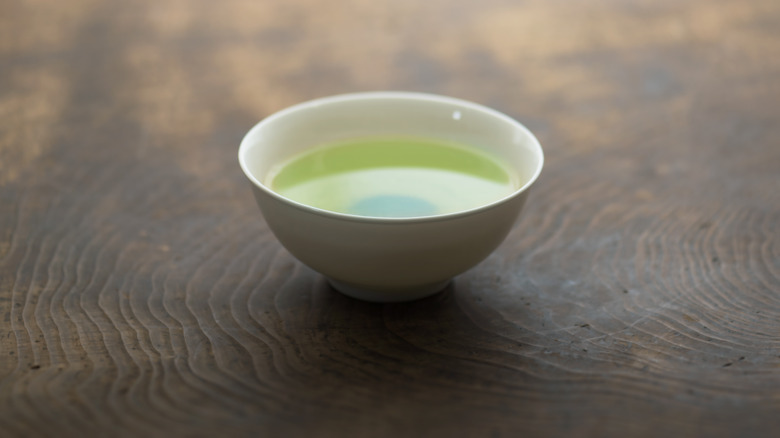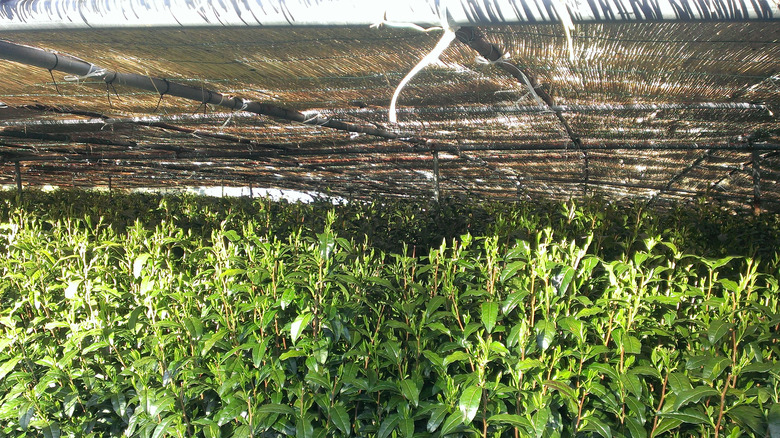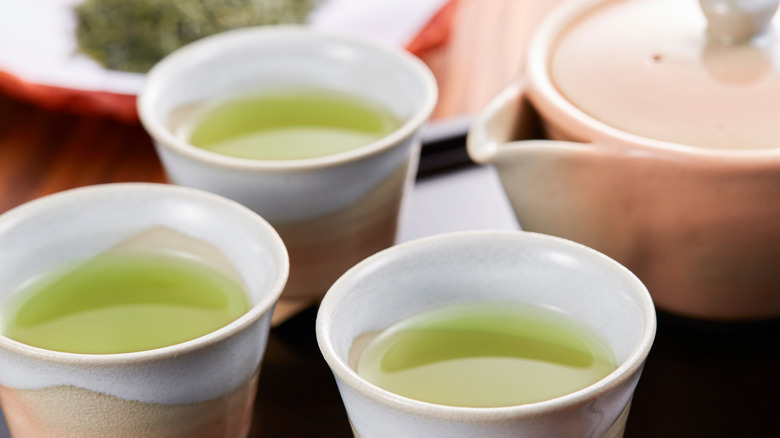The Japanese Tea Variety With The Biggest Caffeine Boost
The Japanese city of Uji, located in the southern portion of Kyoto prefecture, is a tea drinker's paradise. According to Google Arts & Culture, it was here that tea cultivation first took hold in Japan after being introduced to the nation from China in the 13th century. Today, terraced tea fields dot the landscape, turning each hill into a lush green staircase. Go there and you can participate in traditional ceremonies at the annual tea festival or visit Tsuen Chaya teahouse, said to be the oldest in Japan. You can also try a special kind of tea here that you'd have a hard time finding anywhere else.
Uji-cha (Uji tea) comes in three basic varieties, all falling under the umbrella of green tea. Per Live Japan, the three Uji-cha styles are matcha, sencha, and gyokuro. Matcha is, of course, well-known beyond Japan as the bright powdered tea has taken American coffee shops by storm. Sencha is also known around the world, and is a more conventional style featuring dried and rolled tea leaves. Of the three Uji-cha styles, gyokuro is probably the least well-known outside of Japan, but within the country, it is widely considered to be the best of the best. It also happens to have the highest caffeine content among Japanese teas, sometimes eclipsing that of coffee.
Gyokuro has the most caffeine ... and the highest price tag
If you want to enjoy a cup of gyokuro tea, you'll probably pay a good deal more than you would for sencha or even matcha. Tealife calls it "the highest class of tea in Japan," owing to the flavors obtained through its unique and labor-intensive growth process. Gyokuro differs from other green teas because its leaves are deprived of sunlight for about 20 days before harvesting. Per Food & Wine, growers cover the crop with a tarp made from nylon or, more traditionally, rice straw. A similar method is used to produce ceremonial matcha leaves. Obscuring the leaves from sunlight makes gyokuro tea unique on a chemical level.
Tealife explains that blocking out the sun prevents the theanine present in the tea plant from converting into something called catechin. This is significant because, according to the Institute of Food Science and Technology, catechin has a primarily bitter taste. The absence of catechin gives gyokuro a unique flavor that is slightly sweet and packs a serious umami kick. Tealife notes that the smell of freshly-brewed gyokuro is similar to seaweed, and the brew has an unusually thick consistency compared to other teas. It also has far and away the most caffeine of any green tea variety. However, the caffeine's effects may be slightly mitigated by the higher level of theanine, which WebMD explains can cause sleepiness in some people.
Caffeine in gyokuro tea vs caffeine in coffee
There seems to be some disagreement as to how the caffeine content of gyokuro tea compares to coffee. Food & Wine says, "Gyokuro has about 1/3 as much caffeine as a single cup of coffee," although they don't specify exactly how much tea they are comparing. Other sources, like Tealife and Shizen, a Tokyo-based tea maker, claim that gyokuro has as much if not more caffeine than coffee does. Let's analyze the numbers and see if we can't get a firmer idea of how strong gyokuro tea really is.
Firstly, we'll use a standard U.S. cup, which is equivalent to 8 fluid ounces. According to Medical News Today, most 8-ounce cups of coffee contain between 80 and 100 milligrams of caffeine, but this depends on a few factors. For example, cold-brewing your coffee can more than double its caffeine content, and both espresso and instant coffee contain closer to 60 milligrams of caffeine per cup. As far as gyokuro goes, both Tealife and Shizen say it contains around 160 milligrams of caffeine per cup. Nio, another purveyor of Japanese teas, says that gyokuro contains around 120 to 140 milligrams of caffeine per cup. Going by the numbers, it seems that gyokuro actually packs a bigger caffeine boost than coffee.


